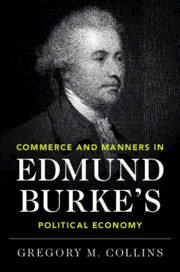Book contents
- Commerce and Manners in Edmund Burke’s Political Economy
- Commerce and Manners in Edmund Burke’s Political Economy
- Copyright page
- Dedication
- Contents
- Figures
- Tables
- Acknowledgments
- Introduction
- Part I Biography
- Part II Market Economies
- Part III The British Constitution and Economical Reform
- Part IV Foreign Trade
- 6 Account of the European Settlements in America, the British West Indies, and the Free Port Act of 1766
- 7 Observations on a Late State of the Nation and the Political Economy of Anglo-American Imperial Relations
- 8 Anglo-Irish Commercial Relations, Two Letters on the Trade of Ireland, and the Politics of Free Trade
- Part V India
- Part VI The French Revolution
- Conclusion
- Bibliography
- Index
8 - Anglo-Irish Commercial Relations, Two Letters on the Trade of Ireland, and the Politics of Free Trade
from Part IV - Foreign Trade
Published online by Cambridge University Press: 24 April 2020
- Commerce and Manners in Edmund Burke’s Political Economy
- Commerce and Manners in Edmund Burke’s Political Economy
- Copyright page
- Dedication
- Contents
- Figures
- Tables
- Acknowledgments
- Introduction
- Part I Biography
- Part II Market Economies
- Part III The British Constitution and Economical Reform
- Part IV Foreign Trade
- 6 Account of the European Settlements in America, the British West Indies, and the Free Port Act of 1766
- 7 Observations on a Late State of the Nation and the Political Economy of Anglo-American Imperial Relations
- 8 Anglo-Irish Commercial Relations, Two Letters on the Trade of Ireland, and the Politics of Free Trade
- Part V India
- Part VI The French Revolution
- Conclusion
- Bibliography
- Index
Summary
Chapter 8 offers comprehensive treatment of Burke’s thoughts on Anglo-Irish commercial relations. Burke was Parliament’s leading proponent of the Irish trade bills in the late 1770s, which were intended to relax commercial restrictions between Ireland and England. In Two Letters of the Trade of Ireland, he argued that free trade granted advantages to the trading nations and produced collective prosperity. Burke’s legislative activities in support of the Irish trade bills also illustrated his famous trustee theory of representation: he was willing to jeopardize his seat in Parliament in pursuit if Irish free trade, a policy goal that upset many Bristol merchants apprehensive about foreign competition. Furthermore, I discuss instances in which Burke did not argue for the maximum amount of free trade, such as his opposition to William Pitt’s commercial propositions and the Anglo-French Treaty of 1786. These cases reveal that Burke took into account other considerations of the British Empire, such as national security, when reflecting on matters of commercial policy. I also challenge the interpretation that Burke was originally a committed adherent of mercantilism. Rather than being a mercantilist or free trade absolutist, he sought to balance a defense of commercial liberty with the imperatives of empire.
Keywords
- Type
- Chapter
- Information
- Commerce and Manners in Edmund Burke's Political Economy , pp. 299 - 344Publisher: Cambridge University PressPrint publication year: 2020

